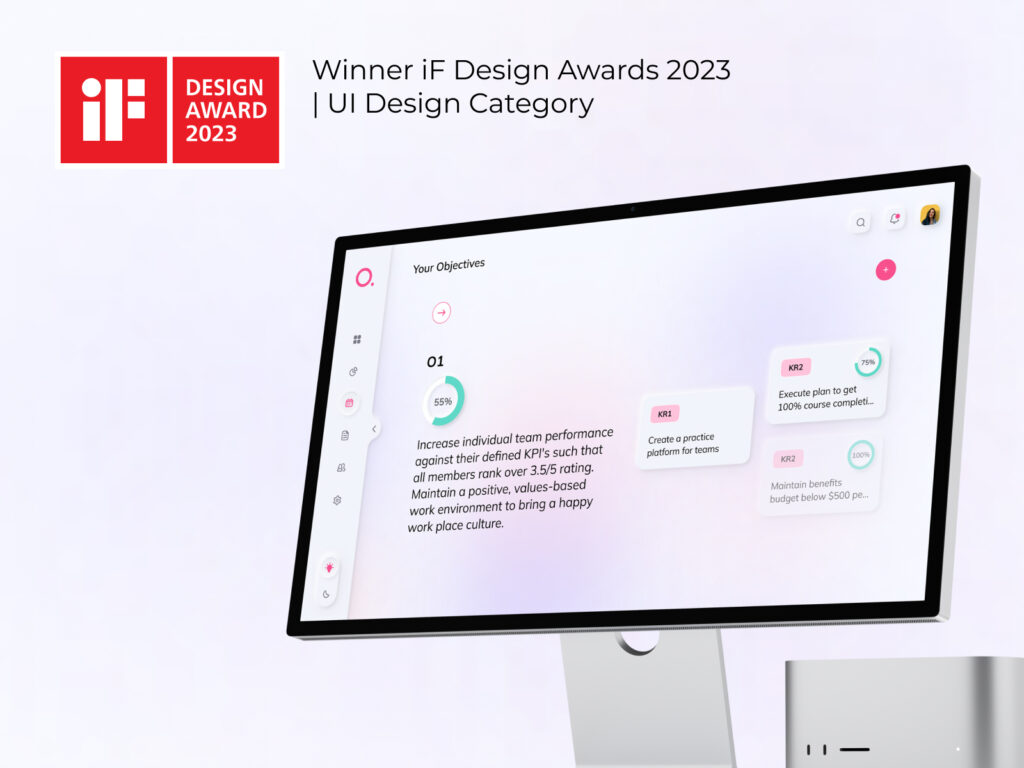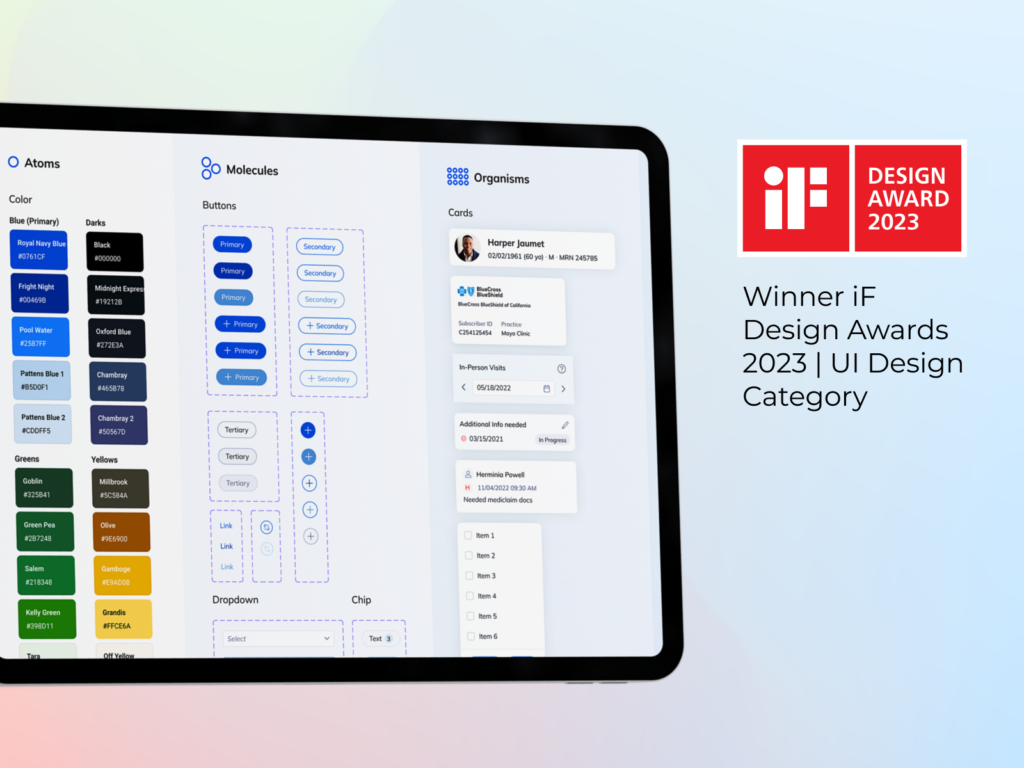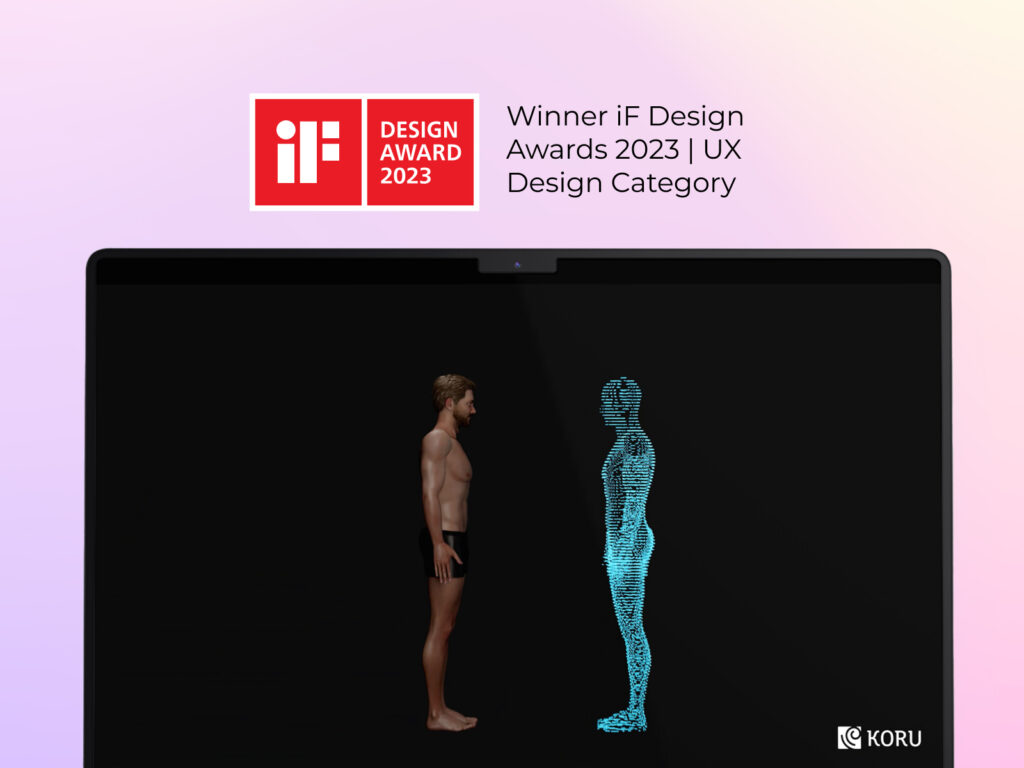11,000 submissions. 56 participating nations. And 3 of our projects made it to the winners’ list of iF Design Awards 2023!
Founded in 1953 in Berlin, Germany, the iF Design Organization is a global symbol of excellence in design.
Their annual competition invites independent, high-profile design experts from all over the world to be part of the jury that determines award-winning designs, based on complex criteria of objective screening standards.
This is what iF Design is all about, it is about gathering people from everywhere who love design and who know design is about solving problems!
iF 2023 Jury Member, Guto Requena of Estudio Guto Requena, Brazil
We at Koru UX Design certainly know a thing or two about solving wicked problems for our enterprise clients over the past 12 years. Our methodologies are rooted in Design Thinking – an iterative process that’s focused on understanding users, analyzing business challenges, defining the right problems, and creating efficient solutions to prototype and validate.
Our award-winning projects stand testament to our expertise in crafting solutions that are data-driven, user-centric, and in line with business goals.
Meet our 3/3 winning submissions
Ayraa: The Intelligent Enterprise OKR Platform

Time-consuming. Stress-inducing. And not to mention, highly confusing.
Enterprise OKR management tools have had a notorious reputation for being clunky, and complex. They also fall terribly short of fulfilling their purpose – that of enabling users to,
- Draft objectives accurately and with ease
- Gain approval for them in minimal time
- Track their own progress through visual, intuitive mediums
- Gain ownership of their mission and contribution to the company
Our platform was built around the smart approach to OKRs by removing 2 of its biggest barriers – the difficulty involved in drafting goals accurately and ensuring they are approved and followed.
The UI design was created based on the principles of neumorphism and glassmorphism, showcasing a calming and inviting appearance to make users feel comfortable and at ease. This was crucial to alleviate the strain that comes with drafting goals and objectives.
The in-built AI-powered assistant was designed to intuitively help users build their KPIs and do the heavy lifting associated with the task. It brought value by enabling users to make a habit of keeping key results updated and actionable.
This project was designed in collaboration with our clients at Ayraa.io and won the iF Design Award 2023 in the User Interface category.
Atomic Design System For Healthcare Product Suite

If there’s one thing that ruins most healthcare product experiences, it has to be their inconsistency and the steep learning curves.
A healthcare product suite typically comprises Electronic Health Records (EHR)
telemedicine software, Remote Patient Monitoring (RPM), Hospital Management Systems (HMS) Healthcare CRMs, e-prescriptions software, etc. The lack of consistency among them is what causes IT siloes, technical debt, and development hurdles. Not to mention the impact on productivity – the continued strain on the mental model of users hampers clinical decision-making and delivery of care.
Following a detailed UX audit, we came to the conclusion that establishing a design system is the best solution to help,
- Unify appearances across apps
- Ensure accessibility
- Meet compliance standards
- Provide users with a sense of familiarity and ease of use
- Create scalable designs to save on resources on development in the long term
We chose to take the Atomic Design approach to create a design system to improve operational efficiency in high-stakes healthcare settings, save resources, and reduce redundancy in design and development sprints. This helped us to design a standard system that could expedite product deployment without disrupting the existing workflows and incur more technical debt.
The concept of Atomic Design pairs UX design with the laws of Chemistry to build easily modifiable user interfaces in the form of atoms, molecules, organisms, templates, and finally, pages. The best part is that it allows UI/UX designers to have step-wise control as they create, thus simplifying the interface design and development processes.
This robust design system enabled the business to improve build time by 34% and thus, focus on innovation and rapid scaling. It enabled faster iterations and testing by 24%, thus ensuring smooth roll-outs of new features, consistent removal of legacy codes, and negating design and technical debt.
The system was W3C – AA level certified which ensured accessibility across user groups along with a decline in errors and the need for customized training, and improved delivery of care through enhanced usability.
This project won the iF Design Award 2023 in the User Interface category.
Digital Twin Technology For Precision Medicine

Every living organism is a unique composition of genetic, physiological, psychological, and social traits. That is why, the ineffectiveness of standardized and approved medications on patients does not come as a surprise.
The very specific genetic makeup of every individual is so different and their interaction so unique that therapies for an average patient may not be well-suited to the actual patient – not to mention how drug testing is not representative at all. Patients with the same diagnosis are known to react differently to the same therapy.
We set out to design a conceptual, futuristic healthcare module that uses digital twins in the metaverse to model organs and single cells or an individual’s genetic makeup, physiological characteristics, and lifestyle habits. We leveraged ML- and AI-driven algorithms relying on data fusion, i.e. the integration of big data from several data sources to run diagnostic tests in a safe and secure manner and deliver personalized medicine and treatment plans.
To design this module, we followed the Minimum Viable Product (MVP) design approach to create a viable, solution in a short span. It is an iterative process based on constant user feedback and remains user-focused throughout.
Our module provides a 360-degree view of the patient’s digital twin in a clinical environment set in the metaverse. Its UI was designed to look modern, bold, sleek, and true-to-life, and convey a sense of realism, accuracy, and trust.
The experience was adapted for all the different aspect ratios and control schemes such as touch, controllers, keyboard, and mouse, designed to deliver an optimal user experience to healthcare professionals.
Combining AI-powered anatomical analysis with the virtual model of a patient helped understand the progression of diseases over time. It will enable medical researchers to identify how the patient will respond to new drugs, treatments, or surgical intercessions, driving a much-needed radical transformation of traditional models of running diagnostics and drug trials.
This future-focused project won the iF Design Award 2023 in the User Experience category.
Enterprise UX design is not for the faint of heart, and our team at Koru UX Design are experts in this domain. Through our custom services such as UI-UX Design, UX Audits, UX Research, and UX Strategy, we offer plug-in teams to support enterprises in improving their productivity, creating a user-led product strategy, and optimizing operational costs.
Looking to solve a similar problem? We’re here to help.









